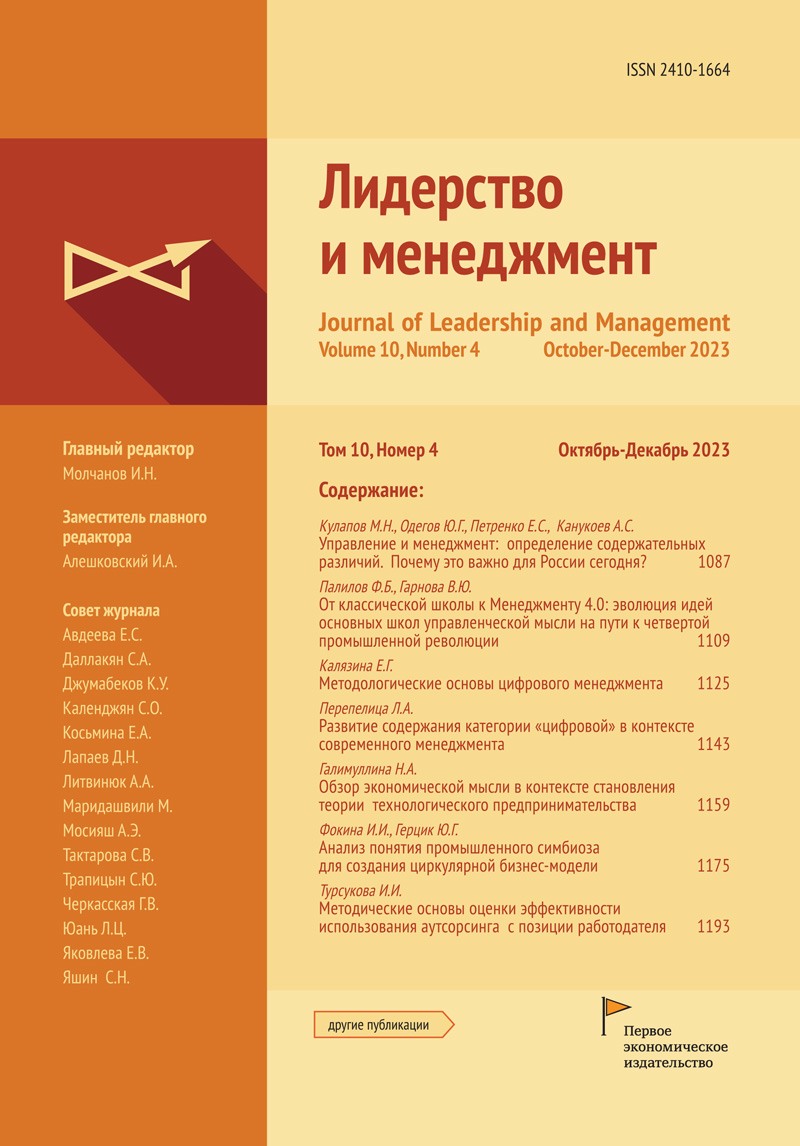Methodological aspects of assessing the level of intra-company trust
- Authors: Pashuk N.R.1, Sadovskaya L.E.1
-
Affiliations:
- Vladivostok State University
- Issue: Vol 10, No 4 (2023)
- Pages: 1271-1280
- Section: Articles
- URL: https://journals.eco-vector.com/2410-1664/article/view/625257
- DOI: https://doi.org/10.18334/lim.10.4.119474
- ID: 625257
Cite item
Abstract
According to the theory of social capital, the development of trusting relationships between economic entities plays an important role at the interpersonal, regional, and organizational levels. Within the framework of this article, the authors consider the category of intra-company trust. On the basis of the literature review, a wide variability of definitions and methods of assessing this category was revealed. The improvement of methodological aspects of assessing the level of intra-company trust was identified as the main goal. The study reveals the main theoretical foundations of the formation and development of intra-company trust. The key stages, methods and indicators of assessing the level of intra-company trust are identified. The achievement of the goal set by the authors will allow taking into account a set of qualitative and quantitative indicators of trust assessment. The results of the study can be used by the top management of commercial organizations interested in solving the problems of increasing employee loyalty to management, team building and improving the organizational climate of the company.
About the authors
Natalya Ruslanovna Pashuk
Vladivostok State University
Email: natalia-kravchenko@inbox.ru
Liliya Evgenevna Sadovskaya
Vladivostok State University
References
- Шарыпова С.Ю. Опросные методы измерения доверия как компонента социального капитала // Социальные и гуманитарные науки: теория и практика. – 2022. – № 1 (6). – c. 125-133.
- Соболева, А.А. Исследование внутриорганизационного доверия по методике Дэниса и Мишель Рейна // Международный журнал гуманитарных и естественных наук. – 2016. – № 1-4. – c. 85-89.
- Соболева А.А. Внутриорганизационное сотрудничество: модель «доверия и предательства» // Интернаука. – 2019. – № 2-1(84). – c. 60-61.
- Бушуев Н.О. Влияние доверия на культуру организации // Вестник науки и образования. – 2019. – № 10-1 (64). – c. 58-61.
- Чикер В.А., Горбашкова Ю. С. Организационное доверие в малом бизнесе и психологическое здоровье персонала. / Ананьевские чтения-2013. Психология в здравоохранении: материалы научной конференции, 22-24 октября 2013 г. / отв. ред. Шелкова. - СПб.: Скифия-принт, 2013. – 598 c.
- Базаров Т.Ю., Кариева Н.Т. Методика выявления представлений о доверии в организации // Социальная психология и общество. – 2022. – № 3. – c. 134-162. – doi: 10.17759/sps.2022130309.
- Каз Е.М. Фактор «Доверие» в концепциях мотивации трудовой деятельности // Вестник Томского государственного университета. Экономика. – 2016. – № 3 (35). – c. 206-218. – doi: 10.17223/19988648/35/17.
- Комаров В.Ф., Алоян Г.Н. Исследование стилей руководства Курта Левина методом деловых игр // Мир экономики и управления. – 2017. – № 2. – c. 110-120.
- Аксенова Т.В., Снигур А.Р., Назаров А.А., Солнцева А.С., Воронова А.С. Стили руководства. Оптимизация управленческой деятельности // StudNet. – 2021. – № 1. – c. 72.
- Трындина Н.С. Анализ подходов к оценке уровня доверия // Вестник ВГУ. Серия: Экономика и управление. – 2023. – № 1. – c. 20-34. – doi: 10.17308/econ.2023.1/10962.
- Ким В.В. Корпоративная культура организации и факторы её формирования // Экономика и социум. – 2019. – № 6. – c. 1173-1178.
Supplementary files









